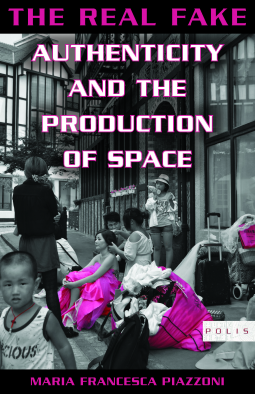
The Real Fake
Authenticity and the Production of Space
by Maria Francesca Piazzoni
This title was previously available on NetGalley and is now archived.
Send NetGalley books directly to your Kindle or Kindle app
1
To read on a Kindle or Kindle app, please add kindle@netgalley.com as an approved email address to receive files in your Amazon account. Click here for step-by-step instructions.
2
Also find your Kindle email address within your Amazon account, and enter it here.
Pub Date Oct 16 2018 | Archive Date Feb 28 2019
Talking about this book? Use #TheRealFake #NetGalley. More hashtag tips!
Description
Available Editions
| EDITION | Paperback |
| ISBN | 9780823280896 |
| PRICE | $9.99 (USD) |
| PAGES | 140 |
Links
Average rating from 2 members
Featured Reviews
 Rebecca T, Educator
Rebecca T, Educator
Through a close study of Thames Town, a recently built community in China emulating “traditional” English design, Piazzoni examines how people make and contest spaces and create ideas of authenticity. Thames Town is less than half occupied, consistent with the large buildout of spaces in urbanizing China generally; sometimes manual laborers squat in the less desirable downtown areas, though they’re excluded from the guarded, gated communities of villas (which are still only half occupied). Prices are up to twice as high as those in non-themed communities, and the green spaces, water features, and general Westernness, including access to an “international” school, are part of what purchasers value. It’s “at once an enormous success and an evident failure.”
Situated relatively near Shanghai, it’s a tourist attraction—tourists come both to see the Englishness and to see the many engaged couples who get their engagement pictures taken against that backdrop. The villa residents may look down on the engaged couples or understand their desire to reach for a vision of Englishness, which they all know is a reconstruction but don’t much care about—Piazzoni argues that one version of “authenticity,” which is consistent with Chinese culture, is successful/useful reconstruction. The engaged couples also vary greatly—some pay for expensive salon packages, while others change on the street and insist on their right to do so equal to the couples with money enough to pay for a salon. “[T]he shoots commonly feature between two and six [clothing] styles, including traditional Chinese, ‘Modern Western,’ and ‘Revolutionary China.’ The photo shoot costs between 20 and 50 percent of the total wedding budget.”
Piazzoni explores the different uses of space by laborers, guards, residents, tourists, and engaged couples and their service providers, arguing that authenticity is both exclusionary and always under contestation. As she says, authenticity is always about “an unresolved tension between permanence and change.” Residents in particular have a lot invested in the exclusionary aspects of the community. “Most residents, for example, avoid hanging their laundry outside to dry—a very common practice in China—to safeguard the ‘English’ atmosphere. Some residents confine themselves to the non-English parts of their houses and leave the English areas untouched.” Others enjoy the contrast with an English exterior and a Chinese interior. And some people build glassed-in balconies so they can continue to dry laundry on lines without being socially condemned. Even the migrant laborers learn that they are more likely to avoid harassment if they keep laundry inside, though in the downtown areas some squatters still use the outside in traditional ways. Best fun fact: the souvenir shop outside the English cathedral, which is a copy of a Protestant cathedral, sells rosaries, pictures of the Pope and crucifixes, because that’s just as Christian as far as the visitors are concerned. Larger point of significance: there are many of these themed communities in China, often constructed to imitate some previous style of living, often Western European specifically. Sometimes, Piazzoni says, architects use the profits from these communities to experiment and build their own styles.



